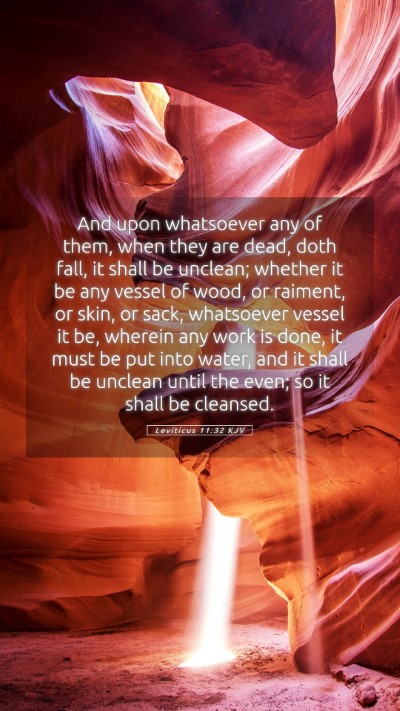Understanding Leviticus 11:32: A Comprehensive Commentary
Leviticus 11:32 states: "And upon whatsoever any of them, when they are dead, doth fall, it shall be unclean; whether it be any vessel of wood, or raiment, or skin, or sack, whatsoever vessel it be, wherein any work is done, it must be put into water, and it shall be unclean until the even; so it shall be cleansed."
This verse provides practical guidelines regarding cleanliness and the laws of ritual purity, emphasizing the importance of maintaining a holy life in accordance with God's commandments. It presents a detailed instruction on how to deal with items that come into contact with the carcasses of unclean animals, thereby illustrating the significance of purity in the community.
Key Themes of Leviticus 11:32
- Purity and Cleanliness: The verse emphasizes the necessity of physical cleanliness and the spiritual importance of separating oneself from unclean things.
- Application of God’s Laws: It showcases God’s systematic approach to holiness and the way public health and personal hygiene were part of spiritual life.
- Community Standards: These standards were not only individual responsibilities but also a matter of community health and social interaction.
Biblical Exegesis from Public Domain Commentaries
Matthew Henry explains that this verse illustrates God's concern for holiness and purity among His people. He notes that cleanliness laws were significant in the Old Testament as God instituted a clear separation between clean and unclean, pointing believers towards personal responsibility in following God's statutes.
Albert Barnes adds further context by discussing the cultural implications of these laws. He highlights the unclean status of any items that come into contact with dead bodies, portraying the seriousness of contamination and its effects on community worship and fellowship.
Adam Clarke offers a detailed analysis of the specific materials mentioned, explaining that vessels of various materials (wood, fabric, leather, etc.) affected the practical aspects of daily life. He emphasizes the need for all those in the camp of Israel to observe these cleanliness laws to not defile the community of faith.
Cross References to Leviticus 11:32
- Numbers 19:16 - Discusses the purification process for anyone who has come into contact with a dead body.
- Leviticus 11:24-25 - Elaborates on the consequences of touching dead animals and the necessary cleansing.
- Deuteronomy 14:4-7 - Reinforces dietary laws and the significance of purity in consuming food.
Significance of Levitical Laws
The laws within Leviticus, including 11:32, serve multiple functions:
- Foreshadowing Christ: The meticulous observance of cleanliness laws points to the ultimate purity of Christ, who fulfilled the law and offered true redemption.
- Cultural Relevance: These guidelines provided a social framework for the Israelites, establishing norms that influenced their daily interactions and religious practices.
- Spiritual Discipline: Engaging with these laws encouraged a discipline of lifestyle that fostered spiritual growth and awareness of God’s holiness.
Application in Modern Context
Understanding Leviticus 11:32 provides vital insights for Christians today. The underlying principles of purity and separation from sin continue to inform personal conduct and community relationships.
Additionally, this verse reinforces the importance of applying Scripture teachings to daily life, fostering a mindset that values holiness and strives for spiritual integrity.
Conclusion
In summary, Leviticus 11:32 is a critical verse that underlines the significance of cleanliness laws as part of Israel’s covenant relationship with God. By examining this verse through public domain commentaries, readers gain a deeper understanding of its spiritual, cultural, and practical implications within both ancient and modern contexts. This fosters a deeper engagement with the Bible, encouraging believers to explore the meaning of Bible verses, enhance their Bible study insights, and apply biblical teachings effectively to their lives.


